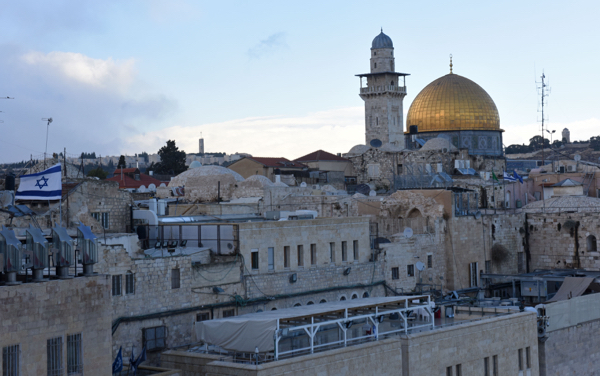President Donald Trump’s recognition of Jerusalem as the capital of Israel delighted white evangelical Christians in the United States, the religious group which voted for him in overwhelmingly high numbers.
In evangelical thought the Jerusalem decision is in keeping with God’s biblical promise of the Holy Land to the Jewish people while the coalescing of Jews in Israel is, to evangelicals, a sign of the end-times when Christ will once again reign on earth.
Catholics, the largest religious denomination in the United States, are wary of this fusion of Christian Zionism and apocalyptical theology and Pope Francis and the Vatican have been critical of President Trump’s Jerusalem move.
But Professor Gavin D’Costa, a prominent theologian and longtime adviser to the Vatican on inter-religious matters, points out that Catholics are also obliged to take the biblical promises to Israel seriously.
The Bristol University Professor of Catholic Theology, who spoke to The Tablet in Rome during a conference on inter-religious dialogue, pointed to a 1980 speech by John Paul II where he told Jews in Mainz the Biblical covenant with Israel remained in place, with the sentiments repeated by Benedict XVI and Francis. All this has built on the landmark 1965 document, “Nostra Aetate”, which revolutionised Catholic-Jewish relations from hostility to friendship.
“If we keep saying the gifts in the covenant are still valid, what do we mean? Does it mean what is central for a Jew which is the land?” he said during an interview at an ecumenical and inter-religious dialogue conference at the University of Notre Dame’s “global gateway” campus, a stone’s throw from the Colosseum. “I think there is a kind of shyness from the Catholic standpoint, but also due to political factors of the the Middle Eastern churches and of the Muslims.”
He added: “From a point of view of doctrinal theology we should get this clear.”
Professor D’Costa is now researching what he has termed a “Minimal Catholic Zionism” where Jerusalem as the capital of Israel “could” be seen as part of God’s plan providing it does not exclude the rights of Palestinians.
This does not mean the professor, who has worked with the Pontifical Council for Inter-Religious dialogue for decades, supports President Trump’s move. This decision, he stressed, is “terribly inflammatory” as it runs roughshod over international resolutions which recognised Jerusalem’s shared religious capital. But that doesn’t mean that it does not raise important questions that the Church needs address.
D’Costa studied under the influential theologian and philosopher John Hick who was a pioneer in the field of religious pluralism and who sparked the Bristol theologian’s interest in the subject.
A British Catholic who was born in Kenya where he was exposed to a variety of religious cultures, D’Costa was first associated with the “inclusivist” theology of one of Catholicism’s most influential theologians, Karl Rahner. Rahner's notion of the “Anonymous Christian” explored how those non-Christians could achieve salvation. His thinking was then taken on by another Jesuit, Jacques Dupuis, but whose own work on religious pluralism in the far east saw him investigated by Cardinal Joseph Ratzinger, later Pope Benedict XVI.
As Prefect of the Congregation for the Doctrine of the Faith, Cardinal Ratzinger issued the controversial document “Dominus Iesus” which put a break on Rahner and Dupuis’ ideas by stressing the uniqueness of Christ – and the Catholic Church – as the path to salvation. D’Costa, who admits to moving to a more “exclusivist” position in his writings on inter-faith matters, says he agrees with the thrust of “Dominus Iesus" although says it was badly presented.
“It felt to me inter-faith dialogue was going too easily down the line of reducing differences and emphasising commonality,” he said of his own journey. “It’s not that I want to bring up difference but if I want to take you seriously I could see you in the way that I like to or try to get to know you for who you are and try and come to terms with that.
“Interfaith dialogue, for too much of the time in the 60s, was like a big Coke advert with people standing signing happily and staring into the sunset. That’s fantastic if it it’s based on something real and lasting but it wasn’t.”
He praises Pope Francis for putting inter-religious matters on the news agenda through his actions such as helping Muslim refugees and inviting Jewish and Muslims leaders from the Holy Land to the Vatican.
“Francis has got such a great sure touch for bringing out a message without words, and without a whole load of theology,” Professor D’Costa said. “And I think that’s what the Church needs very much after two highly educated, very literate Popes. Francis’ charisma is a great blessing."
He added: “Where he has shifted the dialogue is onto action and life, whereas poor old people like are put out of a job because we operate in the academy and in the more reflective part of the Church. But I think this is inevitable in an organic development; in righting the balance.”
Professor D’Costa stressed, however, that this re-balancing had been started by Benedict XVI.
“He was very uncomfortable about all this doctrinal comparison,” he explained. “He began the process of saying let’s talk about social action he just didn’t do it as charismatically as Francis.”



 Loading ...
Loading ...